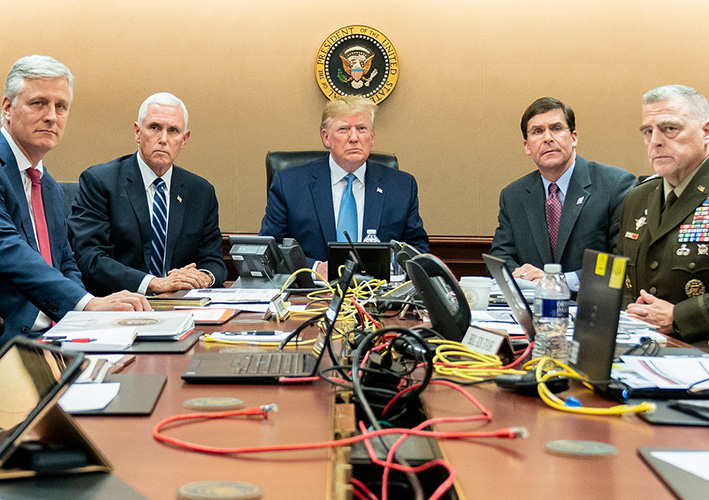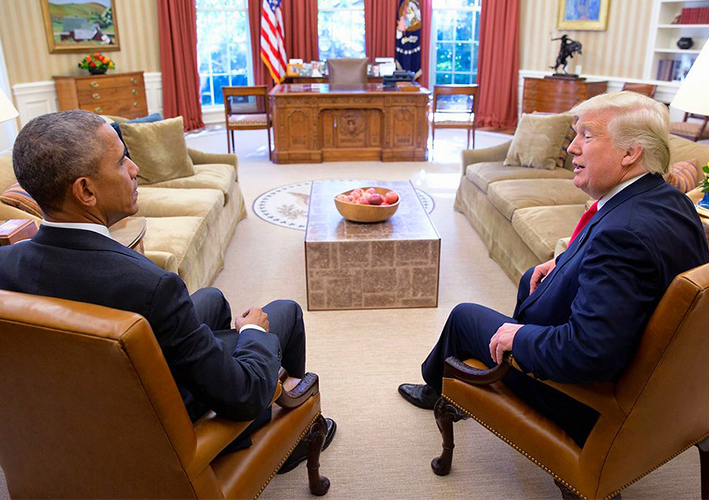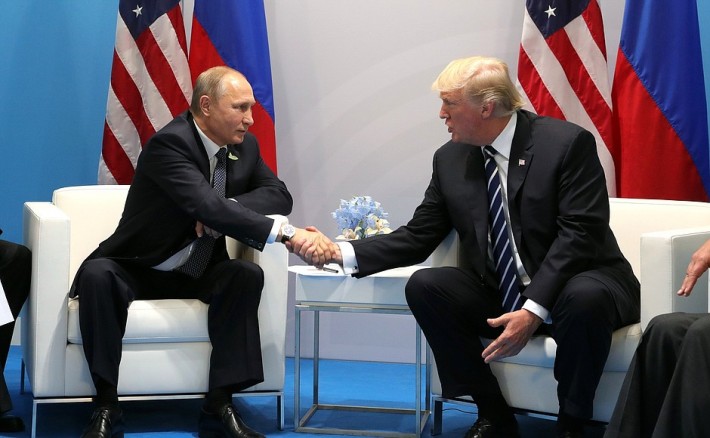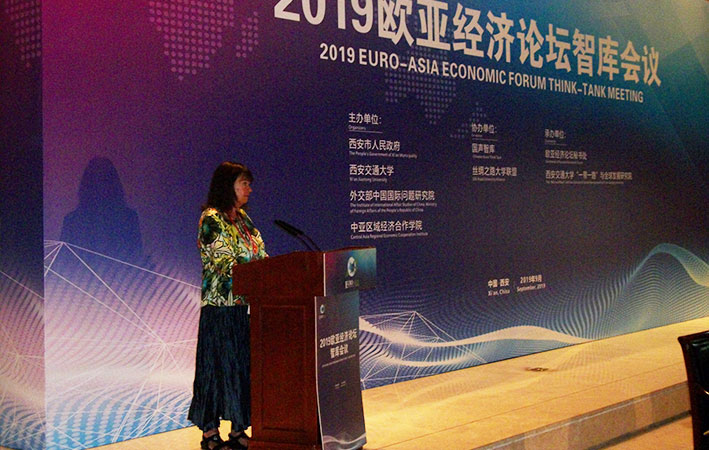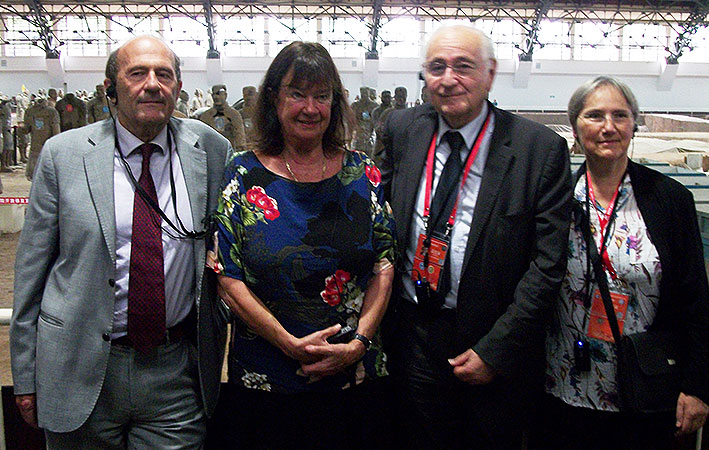by Helga Zepp-LaRouche
Presented at the 2019 Euro-Asia Economic Forum, which took place in historic Xi’an, China, bringing together over 1,000 people, representing more than 58 nations from Europe and Asia, for two days of presentations and discussion. Helga Zepp-LaRouche gave this speech as the keynote presentation to the Forum’s “Think Tank Meeting” on Sept. 11.
For most Chinese, it is very difficult to understand why so many institutions in the West are reacting so negatively to the Belt and Road Initiative (BRI, or New Silk Road), and why an anti-Chinese mood has been stirred up recently; why in the USA, for example, Chinese scientists and 450,000 students are suspected of being spies, which is reminiscent of the worst days of the McCarthy period, while in Europe, some security authorities are making similar allegations. It is difficult to understand, because the Chinese people experience the reality of the BRI from a completely different perspective.
For the people of China, the experience of the last 40 years of reform and opening-up policy since Deng Xiaoping is an incredible success story. From a relatively poor developing country—as I myself experienced it in 1971, when I was in China for the first time—China has developed into the second, and in some categories even the first national economy in the world. Eight hundred million people have been freed from poverty; a wealthy middle class of 300 million and soon 600 million people with a good standard of living has developed. The pace of modernization is unparalleled in the world, as is demonstrated, for example, by the expansion of a 30,000-kilometer high-speed railway system that will soon connect all the major cities.

Schiller Institute founder, Helga Zepp-LaRouche addresses the 2019 Euro-Asia Economic Forum.
Since President Xi Jinping put the New Silk Road on the agenda in Kazakhstan, in September 2013, China has also made cooperation with the Chinese model of success available to all other states for “win-win” cooperation. In the mere six years that have passed since then, there has been an incredible response to the BRI, which now has 130 nations and more than 30 large international organizations cooperating with it. This, the largest infrastructure project in human history, has launched six major corridors, built railway lines, expanded ports, built industrial parks and science cities, and for the first time offers developing countries the opportunity to overcome poverty and underdevelopment.
From the very beginning, the BRI has been open to all the countries of the world. President Xi Jinping has not only explicitly offered cooperation to the USA and Europe, but has also said in countless speeches, that he is proposing a completely new model of international cooperation among nations, a “community for the shared future of mankind.” In doing so, he has proposed a higher conception of cooperation, unprecedented in history, which overcomes geopolitics and replaces it with a harmonious system of development for the benefit of all. In this sense, the BRI is the absolutely necessary economic basis for a peace order for the 21st century!
While in many countries of Asia, Africa and Latin America, and even some in Europe, the New Silk Road is welcomed as the greatest vision, as a concept of “peace through development,” as Pope Paul VI had formulated it in his encyclical of 1967, Populorum Progressio (On the Development of Peoples)—yet its adversaries call the same policy a “competition of systems.” Many Chinese do not understand why this violent reaction, fuelled by geopolitical motives, is taking place. Meanwhile, the West has begun to habituate itself to the changes that have fundamentally altered its political orientation and its scale of values over almost the last 50 years.
The crucial point is that a paradigm shift has taken place in the West since 1971, leading in the opposite direction from the path that China has taken.
Toward a New Fascism
When President Nixon triggered the dissolution of the Bretton Woods System on August 15, 1971, with its fixed exchange rates and gold reserve standard of the dollar, he set the course towards an increasing renunciation of a policy oriented toward the real physical economy, in favor of a policy aimed at the monetary profits of the financial economy, which was increasingly oriented toward maximizing those profits.
This tendency was reinforced by the abolition, in 1999, of the Glass-Steagall banking separation system, and the accompanying complete deregulation of the financial markets, which led to repeated financial bubbles, and finally to the crash of 2008. Yet the central banks have done absolutely nothing to remove the causes of that crash, but on the contrary, have promoted speculation in the casino economy at the expense of the real economy, through continued quantitative easing, zero interest rates and now even negative interest rates. As a result, the trans-Atlantic financial system, today, faces the danger of an even more dramatic crash than that of 11 years ago.

The late American economist, Lyndon H. LaRouche, JR. , 2018
The American economist Lyndon LaRouche, my recently deceased husband, farsightedly warned in August 1971, that a continuation of Nixon’s monetarist policy would lead to the danger of a new depression and a new fascism—if it were not replaced by a new world economic order.
In 1972, LaRouche also opposed the Malthusian-inspired thesis of the Club of Rome, that the “limits to growth” had supposedly been reached; a false doctrine on which the entire environmentalist movement is still based today, and which has led to a “greening” of a large part of the political party spectrum of the West.
LaRouche replied with his book, There Are No Limits to Growth, which emphasizes the role of human creativity as the engine of scientific and technological progress, which is the factor that defines what a “resource” is. At the same time, he also warned that the shift in values towards a rock-drug-sex counterculture associated with this neo-liberal economic policy, would, in the medium term, destroy the cognitive faculties of the population, and thus not only cause a cultural crisis, but also ruin the productivity of the economy.
Unfortunately, this is exactly where we are today.
China took the opposite path in 1978. It replaced the anti-technology policy of the Gang of Four, with a dirigist real economy, based on innovation and financed by a state credit policy.
What is not understood in the West, is that the Chinese economic model is identical, in its basic principles, to the American System, as developed by the first Secretary of the Treasury of the young American Republic, Alexander Hamilton, and his concept of the National Bank and sovereign credit creation. This concept was elaborated by the German economist Friedrich List, who is very famous in China; it was the framework of Lincoln’s economic advisor Henry C. Carey, and it influenced the economic policies of Roosevelt’s Reconstruction Finance Corporation, with which he led the U.S. out of the depression of the 1930s. The Reconstruction Finance Corporation was later the model for the Kreditanstalt fur Wiederaufbau, with which Germany organized its post-war reconstruction and the German economic miracle.
So today, China is doing the same thing that was the basis of the economic success of the USA and Germany, before they turned away from this policy and replaced it with the neo-liberal model, whose “success” can be seen today in the example of the world’s largest derivatives trader, the bankrupt Deutsche Bank.
Cai Yuanpei and Aesthetic Education
An extremely important aspect of the success of the BRI, which is insufficiently understood in the West, and, in my view, not sufficiently emphasized by China, is the basic cultural orientation of the 2,500-year-old Confucian tradition of Chinese society, which was only interrupted during the ten years of the Cultural Revolution. In China, thanks to this tradition, the common good plays a greater role than individualism, which has acquired a greater significance in the West since the Renaissance, but which, to some extent, has taken on a life of its own with today’s liberal change in values, and has degenerated into “everything is permitted.”
The Confucian tradition also implies that the development of the moral character is the highest goal of education, which is expressed in the term junzi, which roughly corresponds to Friedrich Schiller’s concept of the “beautiful soul.” It has therefore been taken for granted in China, for more than two thousand years, that respect for public morality and the fight against bad qualities in the population are the prerequisites for a highly developed society.
In the West today, with the abolition of the Humboldt educational ideal—the core of which had also been the development of the “beautiful character”—the idea of the necessity for moral improvement goes completely against the Zeitgeist, the spirit of the times. It is therefore only from the point of view of the liberal system, that someone could call China’s an “authoritarian system,” but by no means from the point of view of China’s own cultural history.

Four participants of the 2019 Euro-Asia Economic Forum, Italian economist Nino Galloni, Helga Zepp-LaRouche, Solidarité et progrès head Jacques Cheminade, and his wife, Odile Mojon.
Anyone who wants to understand Xi Jinping’s intentions must consider his letter in reply to the request of eight professors of the Central Academy of Fine Arts (CAFA), about a year ago, in which he emphasized the extraordinary importance of aesthetic education for the spiritual development of China’s youth. Aesthetic education plays a decisive role in the development of a beautiful spirit; it fills the students with love, and promotes the creation of great works of art.
Confucius had already understood that the study of poetry and good music should have a decisive role in the aesthetic education of man, but a master key to the understanding of Xi Jinping’s vision, not only of the “Chinese Dream,” but of the harmonious development of the entire human community, is the scholar who created the modern Chinese educational system—the first Minister of Education of the Provisional Republic of China, Cai Yuanpei. During his travels in search of the best educational systems of his time, Cai finally, in Leipzig, came across the aesthetic writings of Baumgarten and Schiller, and, through the writings of the philosophical historian Wilhelm Windelband, became aware of Wilhelm von Humboldt’s educational concept. He was totally enthusiastic about the affinity of Schiller’s aesthetic education to Confucian morality, and recognized that Schiller influenced the spirit of German Classicism with “great clarity.”
Cai used these ideas to modernize the Chinese educational system, and created the new term meiju, for aesthetic education. This strengthened the idea, already found in Confucius, that the refinement of character can be achieved by immersion in great classical art, so that in this way, a bridge can be built between the sensual world and reason. In an essay of May 10, 1919, Cai formulated thoughts that could also build a bridge for today’s problems in the West:
“I believe that the root of our country’s problems lies in the short-sightedness of so many people who want quick success or quick money without any higher moral thinking. The only medicine is aesthetic education.”
Is the Good No Longer Conceivable?
Many people in the West today, find it hard to believe that China could be serious about its idea of win-win cooperation, because they have become too accustomed to the paradigm shift already described, with its axiom that all human interactions must be a zero-sum game. But we in the West should remember that the Peace of Westphalia of 1648, which ended 150 years of religious war, established the principle that a lasting order of peace must take into account the interests of others. It was the Peace of Westphalia which established international law and laid the foundations for the UN Charter.
It is the West, and not China, which has moved away from the principles laid down therein, such as absolute respect for the sovereignty of all states—adopting instead concepts such as the alleged R2P (right to protect), so-called “humanitarian” wars of intervention, and regime change through color revolutions, as we are currently witnessing in Hong Kong.
Xi Jinping’s vision of a “community of a shared future of humanity” corresponds to the Confucian notion of a harmonious development of all, a tradition to which Cai Yuanpei also contributed essential thoughts. He designed the dream of a “great community of the whole world” (datong shijie), which would be harmonious and without armies and wars, and which could be achieved through the dialogue of cultures, comparing the partaking of a culture by the culture of other peoples, with the breathing, eating and drinking of the human body, without which it can not live. Indeed, a look at history shows that any higher development of mankind has always taken place through involvement with other cultures.
It is significant that hardly any real analysts or politicians in the West have responded to Xi Jinping’s idea of a “community of destiny for the future of mankind” in any significant way. If it is mentioned at all, it is only in passing, as if it were not worth regard as anything other than communist propaganda, and as an announcement of China’s intention to play a leading role on the world stage in the future. But what Xi said at the 19th National Congress of the Communist Party of China (CPC) in 2017, was that by 2050, at about the 100th anniversary of the founding of the PRC, the people of China should have democracy, human rights, a developed culture and a happy life. And, not only the Chinese, but all peoples on this planet.
This implicitly poses the question—and answers it positively—that should occupy all philosophers, scientists and statesmen and stateswomen, in view of the many chaotic developments on our planet: Can the human species give itself an order that guarantees its long-term survival, and is appropriate to the specific dignity of humanity as a creative species? Xi’s concept of the one community of a shared future, very clearly presents the thought that the idea of the one mankind be put first, and only then can national interests be defined in agreement with it.
West Must Return to Cusa, Leibniz, Schiller
In order to be able to keep up with the discussion on this level, of how to shape this new order of “reformed international governance,” we in the West must return to the very humanist traditions that we have pushed aside with the liberal system. Corresponding ideas can be found in Nicholas of Cusa, who considered a concordance of macrocosms possible only through a harmonious development of all microcosms. Or in Gottfried Leibniz’ idea of a pre-stabilized harmony of the universe, in which a higher order is possible, because with higher development, the degrees of freedom increase and therefore we live in the best of all possible worlds. Or in Friedrich Schiller’s idea that there need be no contradiction between the citizen of the world and the patriot, because both are oriented towards the common good of the future of mankind.
In conclusion: China must help the West to understand the concept of the New Silk Road. China must not react defensively to the anti-Chinese attacks, but should instead emphasize the brilliant periods of its own history all the more proudly and self-confidently: the depth of Confucian moral theory, which inspired Benjamin Franklin to his own moral philosophy; the profundity of Chinese poetry; the beauty of Literati Painting. And China should challenge the West to revive its own humanistic traditions, of the Renaissance, of Dante, Petrarch and Brunelleschi; of classical music in the culture of Bach, Beethoven and Schiller; and of republican traditions in politics. Only when the West experiences a great “rejuvenation,” reviving the ideas of Alexander Hamilton, Friedrich List and Henry C. Carey, can the problem be solved.
Leibniz was very enthusiastic about China, and he tried to learn as much as possible about it from the Jesuit missionaries. He was fascinated that the Kangxi Emperor had come to the same mathematical conclusions as he had, and concluded that there are universal principles accessible to all people and cultures. He even thought the Chinese were morally superior. He wrote: “In light of the growing moral decay, it seems to be almost necessary that Chinese missionaries be sent to us, who could teach us the application and practice of a natural theology. I therefore believe: that if a wise man were chosen, to judge not the beauty of goddesses, but the excellence of peoples, he would give the golden apple to the Chinese.”
The German middle class and the German small and medium-sized enterprises (SMEs), and cities such as Genoa, Vienna, Zurich, Lyon, Duisburg and Hamburg, and many more, have long since come to realize the potential that lies not only in the expansion of bilateral relations, but above all in the expansion of cooperation in third countries, such as the industrialization of Africa and Southwest Asia.
The enthusiasm that is evident in international cooperation in space travel—the ESA cooperation in the projects of the Chinese Space Agency, the idea of international cooperation on the future Chinese space station, the construction of an international moon village and the terraforming on Mars—underlines that Xi Jinping’s vision of the community of a shared destiny for the future of mankind is within reach.










